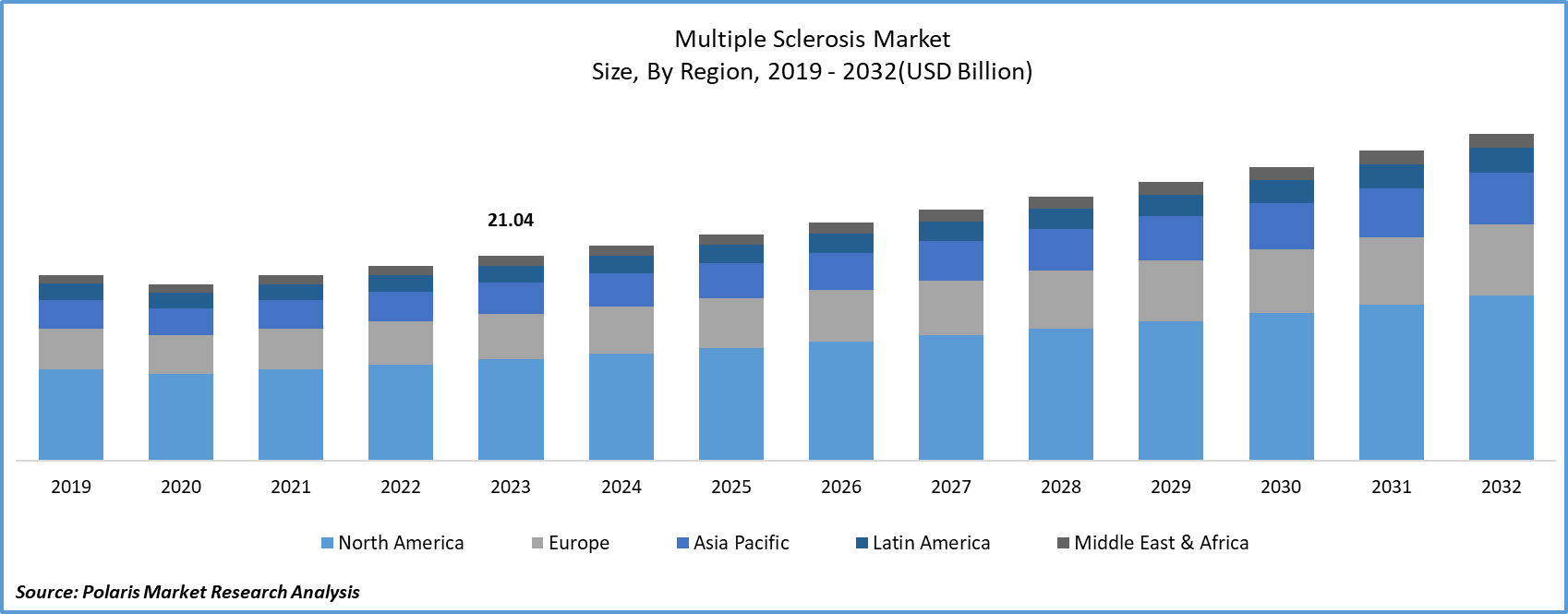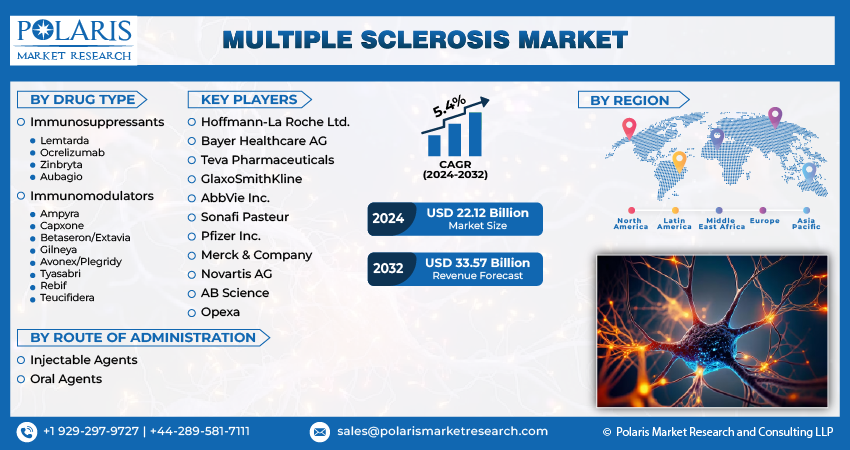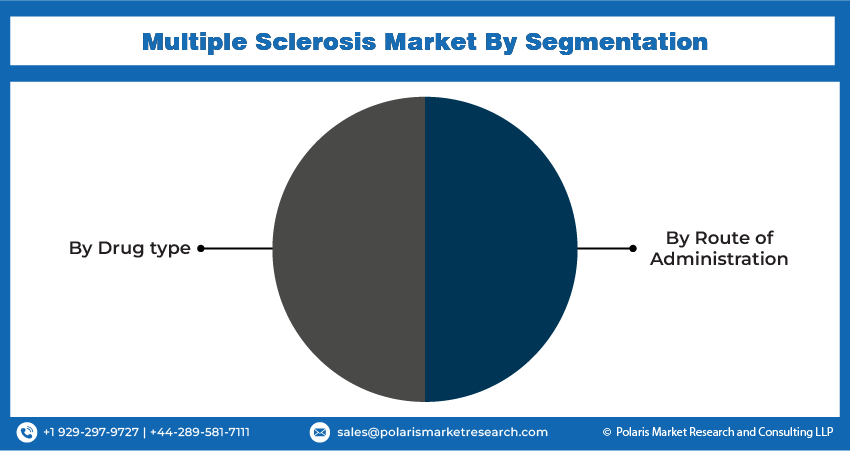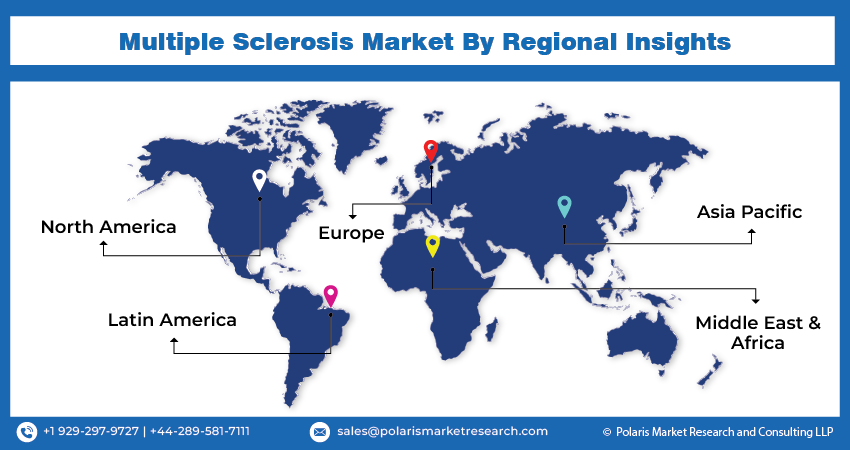
Multiple Sclerosis Market Share, Size, Trends, Industry Analysis Report, By Drug Type (Immunosuppressants, Immunomodulators); By Route of Administration; By Region; Segment Forecast, 2024 - 2032
- Published Date:Jan-2024
- Pages: 119
- Format: PDF
- Report ID: PM1343
- Base Year: 2023
- Historical Data: 2019 – 2022
Report Outlook
The global multiple sclerosis market was valued at USD 21.04 billion in 2023 and is expected to grow at a CAGR of 5.4% during the forecast period.
Multiple sclerosis (MS) is a chronic inflammatory immune-mediated condition that affects nerve cells in the spinal cord and brain, causing demyelination, axonal transection, and neurodegeneration. Injection, oral, and infused medications, as well as muscle relaxants, antidepressants, and physical therapy, are commonly used treatments.
Several factors are driving the growth of the multiple sclerosis market. The growing global awareness of the disease is rising, with numerous organizations worldwide actively engaged in raising awareness about multiple sclerosis in both developed and developing countries. For instance, the American National Multiple Sclerosis Society is a group of people affected by multiple sclerosis who are dedicated to educating the public about the condition and providing support to those who are dealing with it.

To Understand More About this Research: Request a Free Sample Report
- For instance, Furthermore, individuals with diabetes often require ongoing medical attention due to increased hospitalization rates. It, in turn, contributes to the higher demand for Multiple Sclerosis, as they are frequently used in treating diabetic patients with coronary artery disease.
Multiple sclerosis is a disease distinguished by immune-mediated effects on the central nervous system. It involves demyelination, inflammation, and degenerative processes that result in increased brain and spinal cord atrophy as well as neuroaxonal loss. Monoclonal antibodies were extensively utilized as a treatment for multiple sclerosis. Ongoing clinical trials are actively investigating the potential of these antibodies to develop novel medications for the treatment of MS.
The COVID-19 pandemic had a significant impact on the multiple sclerosis market. Patients with multiple sclerosis, a chronic autoimmune disease that affects the central nervous system, witnessed disruptions in their healthcare routines as a result of lockdowns, limited access to medical facilities, and concerns about virus exposure. Delays in clinical trials for new MS treatments impacted drug development timelines. Telemedicine has gained popularity as a method of remote patient monitoring, but some MS patients needed assistance in gaining access to this technology. Economic uncertainty and transfer of healthcare resources influenced market dynamics, affecting both pharmaceutical companies and patients. The pandemic highlighted the importance of adaptable healthcare systems and expedited the integration of digital solutions in the management of chronic diseases such as multiple sclerosis.
The research study provides a comprehensive analysis of the industry, assessing the market on the basis of various segments and sub-segments. It sheds light on the competitive landscape and introduces Multiple Sclerosis Market key players from the perspective of market share, concentration ratio, etc. The study is a vital resource for understanding the growth drivers, opportunities, and challenges in the industry
Multiple sclerosis symptoms can vary considerably depending on the extent of neural injury and the number of affected neurons. Stiffness, urinary incontinence, numbness, fatigue, emotional disturbances, cognitive issues, and feelings of sadness are all common symptoms. The raised emphasis that major industry players are placing on research and development to develop new medications has fueled the growth of the multiple sclerosis market. Furthermore, an increase in collaborative research initiatives between pharmaceutical companies and academic institutions has boosted the market for multiple sclerosis treatments.

Industry Dynamics
Growth Drivers
- Rise in the number of FDA approval will drive the growth of the market
The increase in the number of FDA approval will drive the growth of the market. The FDA approved several relapsing MS medications, including Kesimpta (ofatumumab), Oral Bafiertam (monomethyl fumarate), Oral Zeposia (ozanimod), and the generic form of Tecfidera. Significant advancements include the FDA's recent approval of a portable nerve stimulator designed to assist individuals experiencing walking difficulties, as well as oral Baclofen formulations aimed at alleviating muscular stiffness.
The FDA-approved multiple sclerosis treatment expands not only physicians' toolkit for tailoring treatment plans to individual patient needs, but it also provides newfound hope for improved outcomes and quality of life. As researchers explore farther into the underlying mechanisms of MS and pharmaceutical companies continue to invest in advanced research and development, the accelerating pace of FDA approvals signals a promising era of advancements in the management and treatment of multiple sclerosis.
Report Segmentation
The market is primarily segmented based on drug type, route of administration, and region.
|
By Drug type |
By Route of Administration |
By Region |
|
|
|
To Understand the Scope of this Report: Speak to Analyst
By Drug Type Analysis
- The immunomodulators segment accounted for the largest revenue share in 2023
In 2023, the immunomodulators segment held the largest revenue share. Due to its ability to treat recurrent forms of multiple sclerosis by reducing the progression of symptoms, this treatment primarily minimizes the number of immune cells, modifies their functionality, or inhibits their entry into the central nervous system. The increased demand for immunomodulators stems from their renowned efficacy combined with a relatively safe profile, resulting in a 30% reduction in relapses on average.
On the other hand, the immunosuppressants segment is expected to witness highest growth throughout the forecast period. The increased use of immunosuppressive medications over the last three decades has aided in the evolution of multiple sclerosis treatment strategies. The prevalent approach is based on the view that multiple sclerosis is primarily a T-cell-mediated autoimmune disorder, which has led to the use of combination therapy to increase drug efficacy. These key factors are fueling demand for multiple sclerosis medications, which is driving the growth of the market.
By route of administration Analysis
- The injectable agents segment accounted for the highest market share during the forecast period
The injectable agents segment held the highest market share during the forecast period. Injectable medications serve a crucial role in changing the course of Relapsing-Remitting Multiple Sclerosis (RRMS) and Secondary Progressive Multiple Sclerosis (SPMS) in people with active disease. Furthermore, the ease of administering these drugs at home contributes significantly to the high demand for injectable medications, driving the growth of the market.
On the other hand, oral segment is anticipated to experience fastest growth throughout the forecast period. Due to an increase in demand among people with multiple sclerosis, there has been a significant increase in interest in treatments. Because of its gradual and consistent distribution throughout the body, monomethyl fumarate (Bafiertam) is expected to have few side effects. Ponesimod (Ponvory), which was approved by the FDA in 2021, has been shown in recent studies to reduce brain lesions in comparison to previous trials.

Regional Insights
- North America accounted for the largest market share in 2023
In 2023, North America accounted held the largest market share in the multiple sclerosis market, owing to an increase in drug approvals, a higher incidence of this disease, and growing governmental efforts in regional countries. The FDA's implementation of the Generic Drug User Fee Amendments (GDUFA) is an example of it. This amendment aims to reduce business costs while increasing public access to dependable and effective generic pharmaceuticals. Multiple sclerosis affects approximately 2.8 million people worldwide and approximately a million people in the United States, according to the National Multiple Sclerosis Society.
Asia Pacific is accounted for the fastest growth in the multiple sclerosis market. The growth can be attributed to increased government initiatives, lower treatment costs, and an increase in available treatment options. For instance, the establishment of the China National Registry of Central Nervous System Inflammatory Demyelinating Illnesses in 2021 aimed to provide a comprehensive overview of multiple sclerosis (MS) and related conditions, thereby facilitating comprehensive disease management.

Key Market Players & Competitive Insights
The market is characterized by intense competition, with established players relying on advanced technology, high-quality products, and a strong brand image to drive revenue growth. These companies employ various strategies such as research and development, mergers and acquisitions, and technological innovations to expand their product portfolios and maintain a competitive edge in the market.
Some of the major players operating in the global market include:
- Hoffmann-La Roche Ltd.
- Bayer Healthcare AG
- Teva Pharmaceuticals
- GlaxoSmithKline
- AbbVie Inc.
- Sonafi Pasteur
- Pfizer Inc.
- Merck & Company
- Novartis AG
- AB Science
- Opexa
Recent Developments
- In June 2022, Sandoz launched Dimethyl fumarate HEXAL, a generic drug approved in Germany for the treatment of relapsing-remitting multiple sclerosis (RRMS) in adults.
- In June 2022, Biogen and Happify Health have partnered to provide comprehensive assistance and fortification for people living with Multiple Sclerosis in the digital realm. This strategic partnership aims to improve multiple sclerosis patients' care and treatment pathways, advocate for holistic health goals, provide expert guidance, and foster the establishment of a nurturing support network.
Multiple Sclerosis Market Report Scope
|
Report Attributes |
Details |
|
Market size value in 2024 |
USD 22.12 billion |
|
Revenue forecast in 2032 |
USD 33.57 billion |
|
CAGR |
5.4% from 2024 – 2032 |
|
Base year |
2023 |
|
Historical data |
2019 – 2022 |
|
Forecast period |
2024 – 2032 |
|
Quantitative units |
Revenue in USD million/billion and CAGR from 2024 to 2032 |
|
Segments Covered |
By Drug Type, By Route of Administration, By Region |
|
Regional scope |
North America, Europe, Asia Pacific, Latin America; Middle East & Africa |
|
Customization |
Report customization as per your requirements with respect to countries, region and segmentation |
We strive to offer our clients the finest in market research with the most reliable and accurate research findings. We use industry-standard methodologies to offer a comprehensive and authentic analysis of the Multiple Sclerosis Market. Besides, we have stringent data-quality checks in place to enable data-driven decision-making for you.
Browse Our More Top Selling Reports:
Over-The-Top Devices And Services Market Size & Share
Automotive Electronics Market Size & Share
Eye Tracking Market Size & Share
FAQ's
The global multiple sclerosis market size is expected to reach USD 33.57 billion by 2032
Key players in the market are Hoffmann-La Roche Ltd., Bayer Healthcare AG, Teva Pharmaceuticals, GlaxoSmithKline
North America contribute notably towards the global multiple sclerosis market
The global multiple sclerosis market is expected to grow at a CAGR of 5.4% during the forecast period.
The multiple sclerosis market report covering key segments are drug type, route of administration, and region.

